Most of you will be very familiar with lactose intolerance but may not have heard of milk protein intolerance. So, what is milk protein intolerance? And how does it affect cheese consumption?
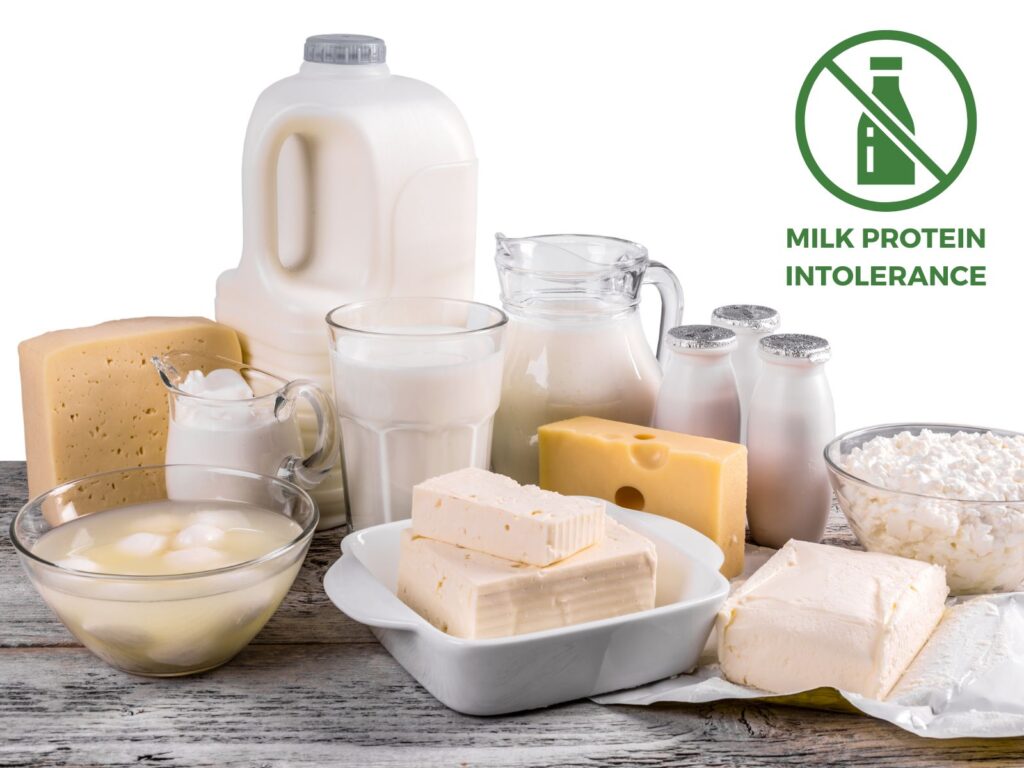
SEE ALSO: What does lactose intolerance mean and why does it matter? →
What is the cause of milk protein intolerance?
The causative agents for milk protein intolerance are usually 2 proteins found in milk called casein and whey. They are present in varying amounts in all types of milk and products that are made from milk e.g. cheese.
Before I delve further into this topic, I need to make a very clear and important distinction. Cow’s milk protein intolerance is different to cow’s milk protein allergy.
Allergy vs Intolerance
Milk protein allergy
Cow’s milk allergy affects around 2% of people at birth and the vast majority of cases resolve as the child grows up.
This type of allergy is what we call anaphylaxis and signs and symptoms include noisy breathing or wheeze, tongue swelling, throat swelling or tightness. These typically occur within minutes of consuming milk.
How to treat allergies
Allergies are a life-threatening reaction and require urgent medical treatment with adrenaline (epinephrine).
If you have milk protein allergy, you need to avoid all food products that contain any type of milk, including cheese.
Moderate symptoms of an intolerance
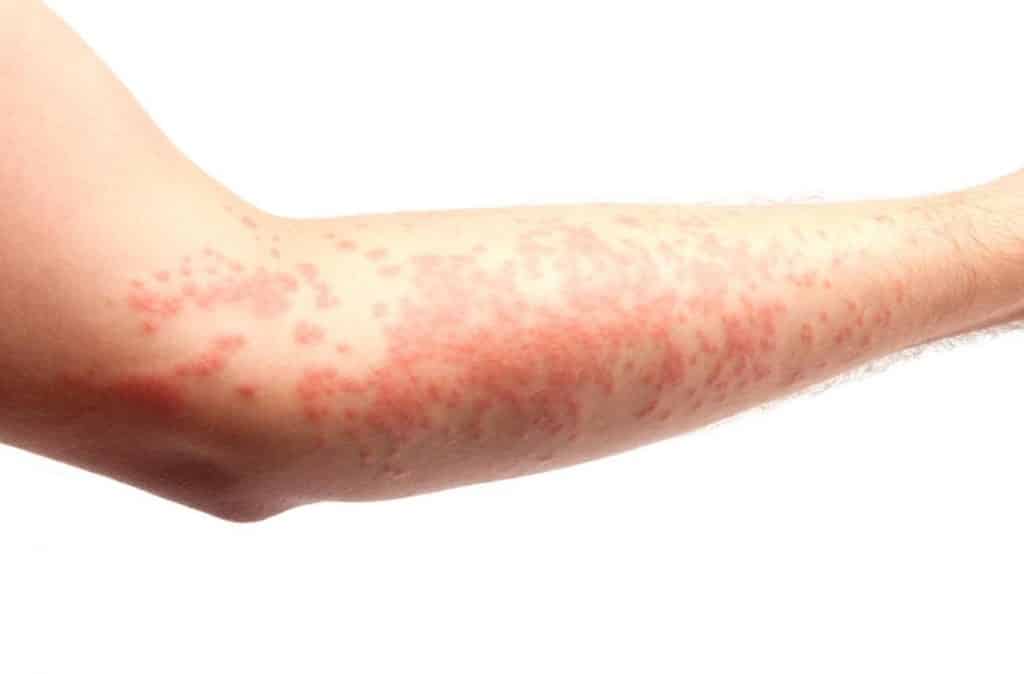
On the other hand, milk protein intolerance causes more mild to moderate symptoms such as skin rashes (urticaria), swelling of the lips, face or eyes, stomach pain, vomiting and diarrhoea.
Whilst it is still caused by your body’s immune system reacting to casein, it is much less severe than an allergy and is not life-threatening. Moreover, this type of reaction tends to be more delayed and can appear a few hours after consumption.
Casein and whey protein levels in different milks
So, where does that leave people with milk protein intolerances when it comes to cheese.
Even though cow’s milk is the most common culprit, other milks such as goat, sheep, buffalo and camel still contain casein and whey. As such, about 90% of people who are intolerant to cow’s milk will also be intolerant to other milks. And, by extension, all cheeses that are made with said milks.
The effect of heat on milk proteins
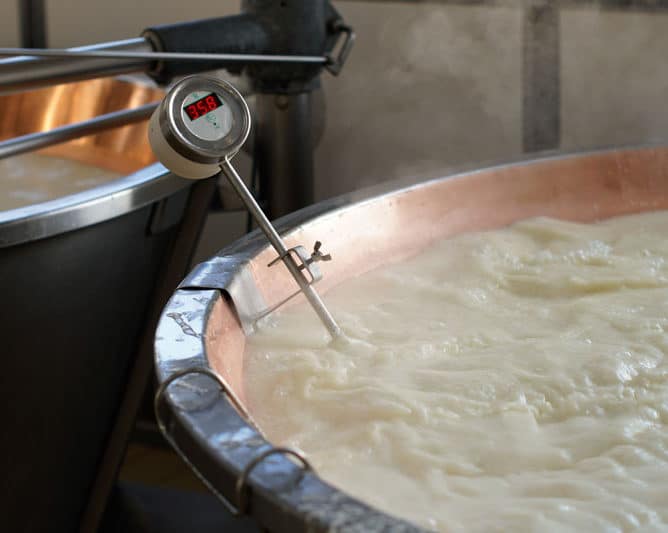
But this is where it gets very interesting. Heating milk will actually denature most of the whey protein and a small amount of the casein protein. As a consequence of this, cheeses that are made with cooked curds will actually have a different protein content to uncooked ones.
How about pasteurisation?
A quick word on pasteurisation. This process invented by Louis Pasteur involves heating milk to 71.7°C (162°F) for 15 to 25 seconds. Unfortunately, this process denatures only 2-3% of the whey protein in milk and, as such, is unlikely to make a difference for people with milk protein intolerance.
Cooking the curds
However, there are a large number of popular cheeses that are made by cooking the curd formed upon addition of rennet to milk. Examples of fabulous cheeses made from cooked curds include Parmigiano Reggiano, Gruyère and Mozzarella.
In the case of Parmigiano Reggiano, the curds are cooked at 55°C (130°F) for one hour. Unsurprisingly, this leads to a much more pronounced reduction in the whey protein content.
Examples of cooked curd cheeses
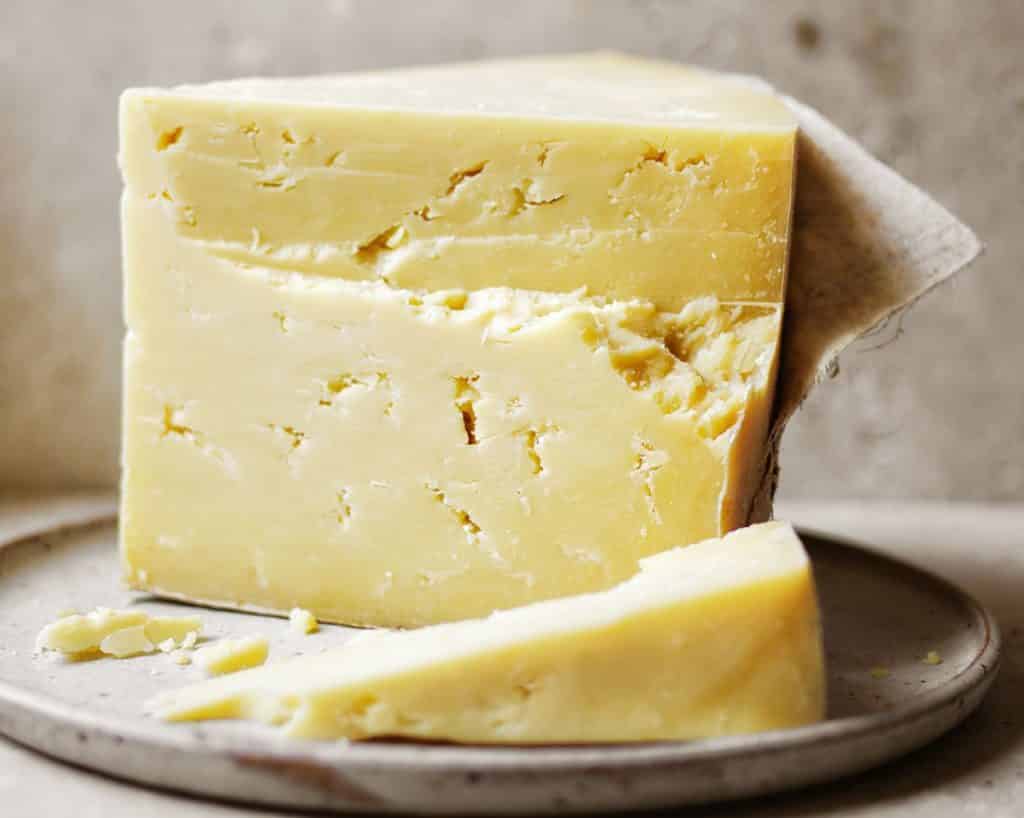
Some other semi-hard to hard cheeses like Morbier, Cheddar and Manchego are made from larger curds that have been more gently heated. Overall, this process, coupled with a long maturation period, will reduce the whey protein content as well.
Does this mean that you won’t get any reaction to the cheese? Not necessarily because the extent of the sensitivity varies from one person to the next. What it does mean though is that there are options that you can try in small amounts if you are craving cheese.
Do you have milk protein intolerance? Or know someone who does? Leave me a comment below.
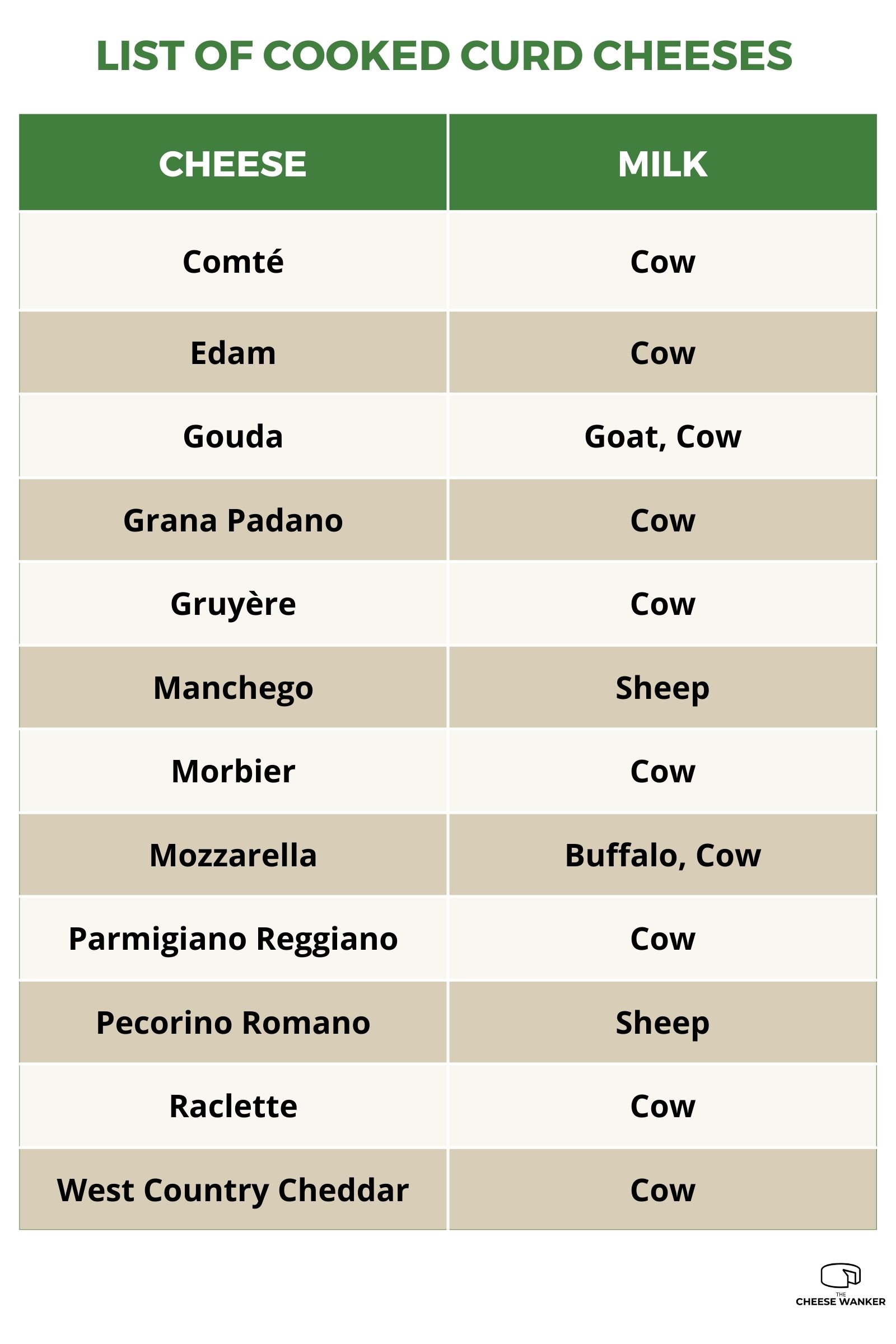
References
All the advice in this article relating to what cheeses you can eat if you have milk protein intolerance is based on the recommendations by health authorities in Australia. If you are unsure about what you can or cannot eat, please consult your doctor.
ASCIA: Cow’s Milk Dairy Allergy
Parmigiano Reggiano Consortium: The Making of Parmigiano Reggiano
Science Direct: Effect of Pasteurisation on milk protein

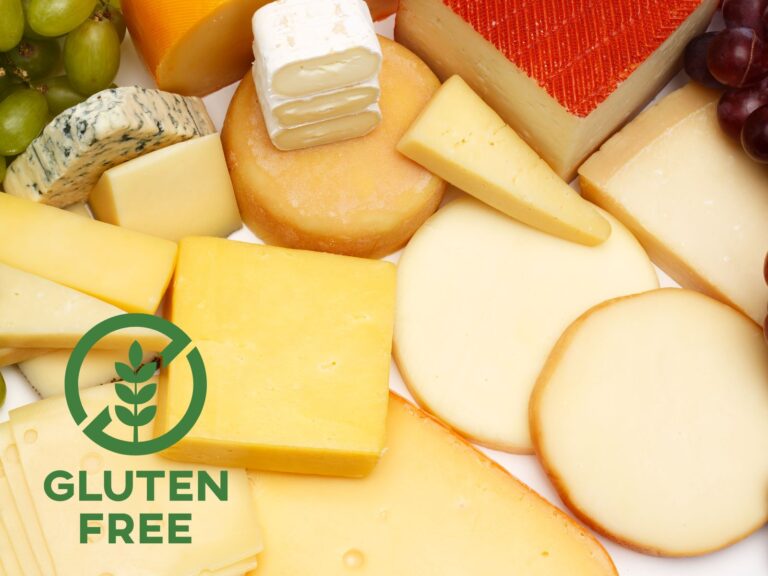

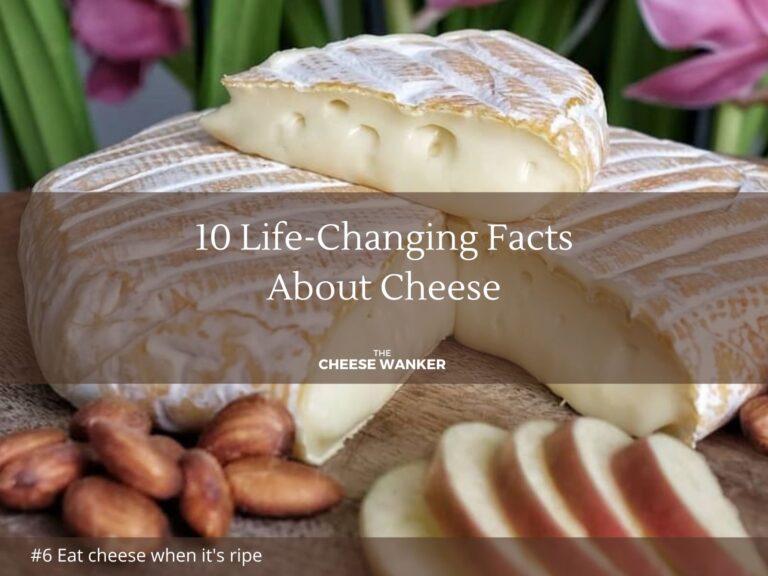
This is really interesting! I’ve known that I have an intolerance to cows milk protein for about 10 years after trial and error and cutting out different foods. I can tolerate goats milk (but have always hated milk) and goats cheese, and have no discovered my beloved manchego! I buy 3 small blocks at a time and go through that in a week! It makes sense that I can eat more of that as it’s a harder cheese, than the goats fetta that I sometimes buy and get a sore belly from. Thanks for all your info, it’s fascinating!
Hi Lisa, thank you for reading our post and leaving a comment. It is always interesting to hear of the experiences of people with milk protein intolerance. And it’s great to hear that you can safely eat Manchego! It is such an amazing cheese and is definitely one of my own favourites! Keep us post on how you go with other cheeses.
I adore all cheese, but have developed an intolerance to whey and casein, no matter which animal it comes from. Thank you for giving me a list to try when my craving simply overwhelms me.
That is really unfortunate. Let me know how you go with your experiments. Be sure to try small amounts. And do it on days that you know you will be home.
Does Haloumi qualify as a “cooked” cheese, such that someone with a milk protein sensitivity could have some without trouble?
Hi David, thank you for reading our post and leaving a comment. Indeed, most Halloumi recipes require the curds to be cooked. As a result, this process does reduce the amount of milk protein in the cheese to some extent. If what you have is a sensitivity to milk protein (not an allergy), it could be worth trying a small amount of Halloumi to see if your body can process it. If you do decide to give it a go, please keep me posted!
This is interesting, I didn’t know that some cheeses were heated/cooked during production. However where you have described a ‘milk protein intolerance’ this is a milk protein allergy. Allergy symptoms can range from mild to anaphylaxis, if you experience urticaria (especially as severe as shown in that photograph), pruritus, breathing difficulties or even digestive problems these are all signs of an allergy and it’s important to distinguish these from something like a lactose intolerance.
Very interesting article. This all makes more sense now why lactose intolerance otc pills weren’t helpful. I had a food sensitivities panel done awhile ago and casein and whey were both flagged as sensitive. I’ve tried several non-dairy cheese alternatives and they don’t have the same taste and texture so I have been having no cheese or can be miserable if I do. Do you have a list of cheeses by casein and whey content?
Thanks
Hi Linda, Thank you for reading our post and leaving a comment. We’re sorry to hear about your struggles with milk protein. Unfortunately, there isn’t a lot of data on the casein and whey composition of different types of cheese. We do however have a large database on the total protein content in cheese. While most cheeses contain around 20-25 g of protein in a 100-gram serve, you can find some types that are lower in protein. Some examples are deli-style American Muenster cheese (4.6 g), Cottage Cheese (10 g) and Ricotta (11 g). Have you had any experiences with those cheeses?
Hello,
I liked this article and have a protein intolerance but can generally tolerate all non cow cheeses. I can tolerate goat yogurt but not so much sheeps yogurt, though sheeps ricotta is fine (though hard to find in Australia) and happily eat bufallo mozarella. Having read this, I wonder is it is because the mozarella is cooked.
I do a yearly cheese fondue with gruyere and emmental and dont seem to react. I was wondering if it was the cooking of the fondue.
Interestingly if something is not going to agree with me, I the milk/yogurt/cheese tastes off.
Cheers and cheese
Hi Monique, thank you for reading our post and leaving a comment. It’s always fascinating to hear about people’s experience with milk protein intolerance. There’s very little evidence that would suggest that cooking an already made cheese would affect its protein content. It brings about more structural and microbial changes. Your ability to digest the fondue might have more to do with the fact that both Gruyere and Emmental have cooked curds.
It took a long time to discover my cow’s milk intolerance. I can easily tolerate sheep yogurt and cheeses. I also tolerate butter, but no cow’s cheese unless it is well aged like aged cheddar and Parmesan. I’m wondering, given this strange tolerance, what else can I eat dairy-wise. I do love cheese, but I’m afraid to try more on my own.
Thank you for the list of cheeses to try! Being allergic to gluten and just learning lately of a cow’s milk protein issue causing headaches, I was missing gluten free pizza with cheese on it. I am still a little scared to try mozzarella because I have been really enjoying headache free days. 🙂 But someday soon I am going to try it. Thank you for a great and helpful post!
Hi Jonah
This is a very useful article! I’ve been reading a lot of the scientific literature about dairy protein allergies/intolerances and this was a nice summary.
I developed major issues with digesting dairy a few years ago and finally narrowed it down to an issue with whey protein (realized it after eating fish sticks with whey protein in the batter). I ADORE cheese so having a list of cheeses with a low whey content is sooo helpful. Thank you!